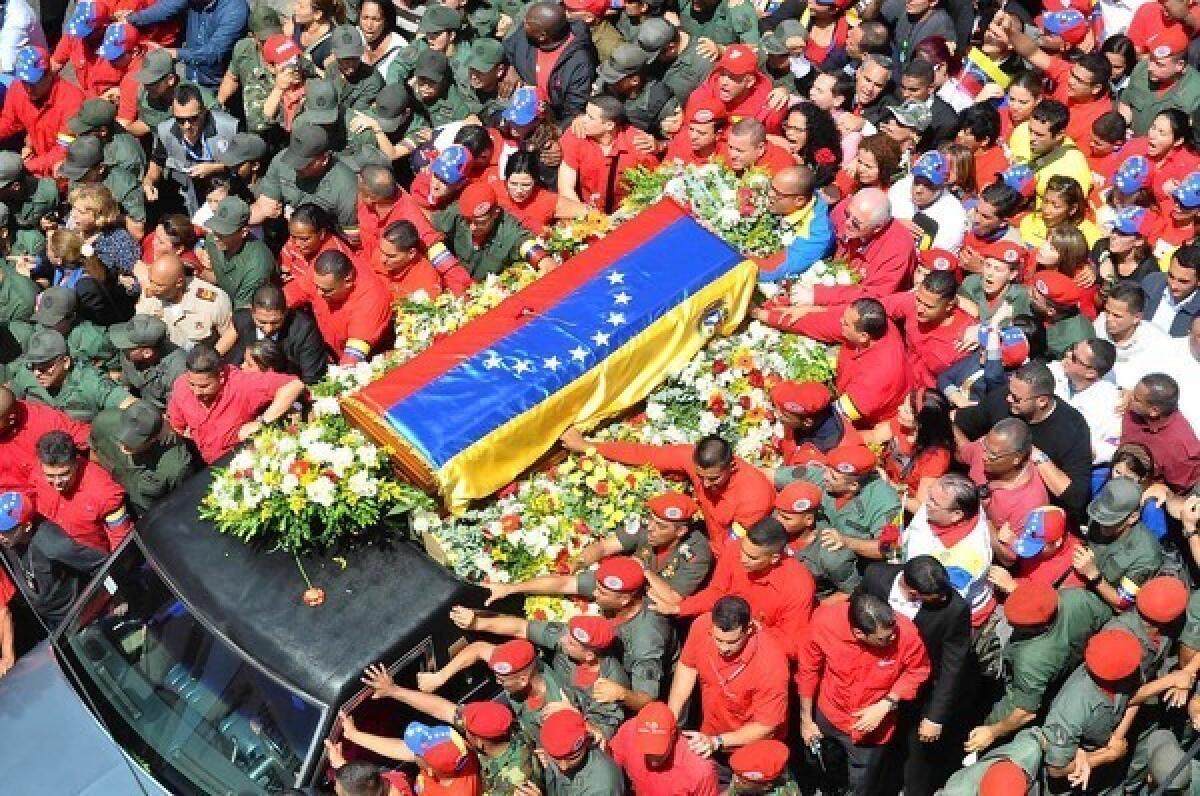Among Venezuela’s poor, Hugo Chavez ‘will never be forgotten’

- Share via
CARACAS, Venezuela — Her neighborhood on the outskirts of this capital city is a dangerous, gang-infested barrio where homes are often made of corrugated tin and other collected refuse. It is by no means the ideal place to raise a family.
But Taina Carrillo, a 35-year-old homemaker, said the slum of Petare was even worse before Hugo Chavez took over Venezuela.
“Now we have a three-story medical clinic in the middle of the barrio,” said Carrillo, one of hundreds of thousands of mourners who packed Caracas on Wednesday, crying and chanting as the coffin containing their fallen leader was pulled through the streets. “That’s why I am 100% Chavista. We mattered to him, and he made us feel important. He will never be forgotten.”
PHOTOS: Hugo Chavez | 1954-2013
Chavez’s many enemies may have dismissed him as a tin-pot caudillo, a conspiracy theorist, a megalomaniac; a buffoonish jester on the world political stage, a serial abuser of human rights at home.
But to understand the phenomenon of Chavismo, it is crucial to listen to the voices of the people who came to proclaim, one last time, their love for the man who spent much of his 14 years as president focusing his attention — and the power of the Venezuelan state — on the plight of the poorest.
Maria Eugenia Mendoza, a 55-year-old special education teacher, held aloft a Chavez poster Wednesday afternoon and sported, like so many others, a bright red T-shirt, the sartorial symbol of Chavez’s socialist project.
TIMELINE: The life of Venezuela’s Hugo Chavez
Before Chavez, she said, the children she works with had been marginalized. Their classroom was a run-down warehouse. Their school supplies were scant.
“Poor, handicapped students were forgotten until he came to power. They suffered from a total lack of focus by the government,” said Mendoza, a teacher for 25 years. “Under Chavez there was a complete change. We now have a new school, curriculum, diagnostic equipment, trips and even sports programs.
“He gave us hope,” she said. “That’s why I am a Chavista.”
Chavez, 58, died Tuesday after a long bout with cancer that he suggested had been given to him by shadowy U.S. agents. It was the kind of statement that made him so divisive at home and abroad.
But Wednesday in Caracas was not a day for public debate of the dead president’s perceived flaws: his friendship with Iran and alleged support of the leftist guerrillas in neighboring Colombia; his stifling of press freedoms; his brazen disregard of judicial independence; or even the question of whether his revolution — which has also brought rampant inflation, food shortages and scared off foreign investors — is sustainable in the long run.
Instead, the people poured into the streets, mobbing the truck that pulled his flower-topped coffin, tossing their baseball caps on top as it rolled down the Avenida Proceres toward the Venezuelan Military Academy, where his body is to lie in state until a funeral Friday morning.
“Chavez was more than just an image to us. He was a very human figure who worked to improve our lives,” said information technology engineer Vicente Rodriguez, 47. “Before, I couldn’t have cared less about politics, but he got me involved and interested in working for the common good.”
Rodriguez said he donated part of his time as an adult-education consultant.
Where some saw buffoonery in Chavez, others perceived a human touch, and it was one reason they loved him.
But Chavez did not stop at rhetoric. He filled empty bellies, stocked classrooms and tended to the ill. Most famously, using the nation’s oil wealth, he created a system of “missions,” or grass-roots development programs, which offered poor Venezuelans unprecedented access to education, healthcare, sports and culture programs, and subsidized housing.
Doctors from Cuba were imported to toil in the country’s worst slums. Programs were created for homeless children. Workers were given vocational skills in workshops named for Che Guevara. Others were organized into New Deal-like conservation corps, planting forests and fruit plants.
This unprecedented attention, combined with high oil prices before the worldwide economic slump in 2008, allowed Chavez to slash the Venezuelan poverty rate from 48.6% in 2002 to 27.6% in 2008, according to United Nations figures.
The beneficiaries of such ongoing largesse are the main reason Chavez’s handpicked successor, Vice President Nicolas Maduro, is favored to win the election to succeed him. According to the constitution, the vote must be held within 30 days of Chavez’s death.
“The poor were the forgotten ones before Chavez took office. Now we are visible, and the government has given us power we never had before,” said Francisco Umbria, a retired municipal employee who stood in the massive crowd, waiting for the casket to roll by. “Only people who are forgotten die, and Chavez will never be forgotten, not for 100 years.”
By the late afternoon, Chavez’s casket had arrived at a chapel in the military college, where military pallbearers in olive green uniforms solemnly carried their former commander down a narrow, bright red carpet.
Times staff writer Fausset reported from Mexico City and special correspondents Kraul and Mogollon from Caracas. Daniel Hernandez and Cecilia Sanchez in The Times’ Mexico City bureau contributed to this report.
More to Read
Sign up for Essential California
The most important California stories and recommendations in your inbox every morning.
You may occasionally receive promotional content from the Los Angeles Times.













